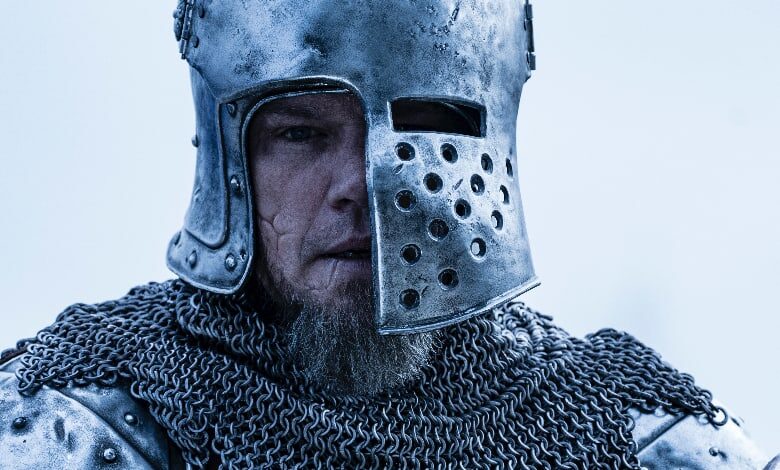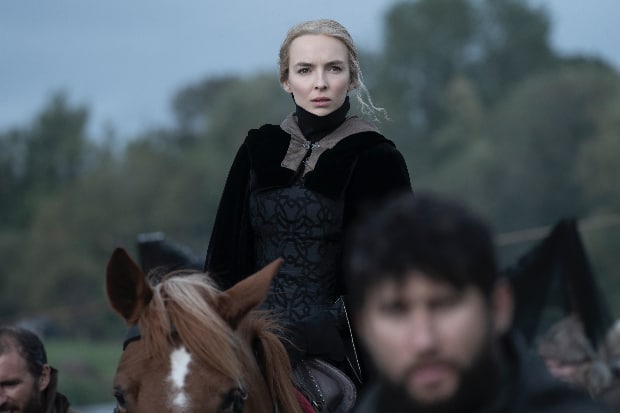
Ridley Scott’s “The Last Duel” takes place in France of 1386, where two former friends, Sir Jean de Carrouges (Matt Damon) and Jacques Le Gris (Adam Driver), are about to fight to the death.
The reason: Carroughes’ wife, Marguerite (Jodie Comer), has accused Le Gris of rape.
The two are about to have the burliest death match ever seen, until the title card pops up, informing us that we will see this magnificent duel, but after flashing back, again and again, for nearly three hours, before we return to the film’s centerpiece.
A complex, troubling piece of work has been turned into a stilted, tedious film. The screenplay was adapted from Eric Jager’s acclaimed 2004 non-fiction book of the same name by no less than Nicole Holofcener (the writer/director of “Enough Said”) and Damon and Ben Affleck. The latter collaboration marks their first script since the Oscar-winning “Good Will Hunting.”
The noble intentions of the screenplay, which explores how news of rape is received in an oppressive, misogynistic environment, are muted by out-to-lunch editing, crucial miscasting and a sour feel. In addition to nearly every single scene looking like this was shoot on an overcast day, the dreary music score also grinds this down.
The story has been broken up into chapter headings and told from different perspectives, an obvious nod to Akira Kurosawa’s game-changing “Rashomon” (1950).
Instead of the multiple versions of the same events providing heightened illumination, they should have just used the final version, the “true” story, and left out the others (and trimmed down the overly extended first act, the biggest culprit as to why it sports an absurd 153-minute running time).

The physical details of the production are impressive, as the costumes and sets are rich with detail, a trademark of Scott’s uncanny ability at world building in any genre. A quality that isn’t as sharp is Scott’s dedication to the Cecil B. DeMille approach to epic storytelling.
Yes, the sets are magnificent, and the scale is grand, but the actors are modern day movie stars visibly working too hard to justify their presence in a period film. Scott’s “Exodus: Gods and Kings” (2014) took a lot of heat for casting Caucasian actors as Egyptians; what many overlooked is the filmmaker’s tendency to cast actors and have them play roles in the same way Richard Burton or Yul Brynner or Charlton Heston would have.
RELATED: Scorsese’s ‘Irishman’ Caps Epic Gangster Canon
Despite “The Last Duel” taking place in France in the 1300s, everyone speaks with a British accent and sounds like they’re aiming for Shakespearean illocution. Naysayers will have lots to complain about (did people in the 14th century really say, “We’re broke” and frequently use the F-word?), but the real issue is that Scott is shaping this the way DeMille would.
One can either admire his classical sense of cinema or consider how Ben Affleck is as out of place here as John Wayne once was in “The Greatest Story Ever Told.”
Comer’s compelling performance, which really shines in the third “chapter,” when her character gains the film’s focus, is the film’s true center. Of the male stars, Driver fares best, doesn’t look out of place and mostly resists the temptation to go overly broad.
Affleck hams it up, admirably leaning into everything that makes his character loathsome but dialing less into the spoiled posture and more into a demonstration of how to act like a jerk. It’s not dissimilar to his supporting role in “Shakespeare in Love,” another example where he adds his star power to a period project but winds up a distraction.
Watch this extended clip featuring Jodie Comer, Matt Damon, @BenAffleck and Adam Driver as they prepare for #TheLastDuel. Get tickets now to see it in theaters October 15. https://t.co/iG28NccF9t pic.twitter.com/ZUrQJgNTI9
— The Last Duel (@TheLastDuelFilm) October 5, 2021
No one has it worse than Damon – sporting one of the all-time worst haircuts in cinema and chunky facial scars, the actor is fully committed to the emotional needs of the role. However, he’s also too contemporary, straining with his accent and dialog.
Like Damon’s performance in “The Great Wall,” you admire Damon for trying but his miscasting and ridiculous haircut undermine the commitment to the work. Only in the last half, when the character becomes positively loathsome, does he fully connect with the role. However, all these characters feel like sketches rather than fully realized figures.
Scott is returning the sense of honor among warriors and designated battles to the death that made his debut film, “The Duellists” (1977) so riveting. Also, since “The Last Duel” is largely a drama about rape and the despicable way men and society at large blame the victim, it also taps into the themes in Scott’s now-30-years-old “Thelma & Louise.”
Yet, while the Susan Sarandon/Geena Davis neo-western has never lost its emotional power and appeal, “The Last Duel” is one of the least enjoyable works Scott has made. It’s comparable, in themes, tone and audience distancing, to Luc Besson’s “The Messenger – The Story of Joan of Arc” (1999).
There are immediate themes of victim shaming, sexist attitudes towards attractive people and stupid people enforcing their opinions about women and their bodies. Yet, for a film that gives a voice and utmost sympathy to its central female character, what lingers afterward is how extended and harrowing the multiple rape scenes are.
Poor Comer has to endure some truly ugly bedroom scenes with her male co-stars. Necessarily unpleasant? Maybe. Gratuitous? Definitely.
The fierce climactic battle gives this some late-in-the-game dramatic power. After the redundancy of the shifting versions of the same events, it at least has a strong climax. However, the very last scene brings another Scott film to mind: “Matchstick Men” (2003), a near perfect film that, nevertheless, Scott marred by forcing a last-minute happy ending on a story that didn’t need one.
The same thing happens here, as the sickly light blue hue of Dariusz Wolski’s cinematography is suddenly richly colorful in the very last scene, an attempt to have the audience walk out feeling good, which is out of line with the brutal nature of the material.
Comer gives soul and feeling to her role and Scott remains a knockout visualist, but here is one of his few films that I’d never sit through again.
Two Stars
